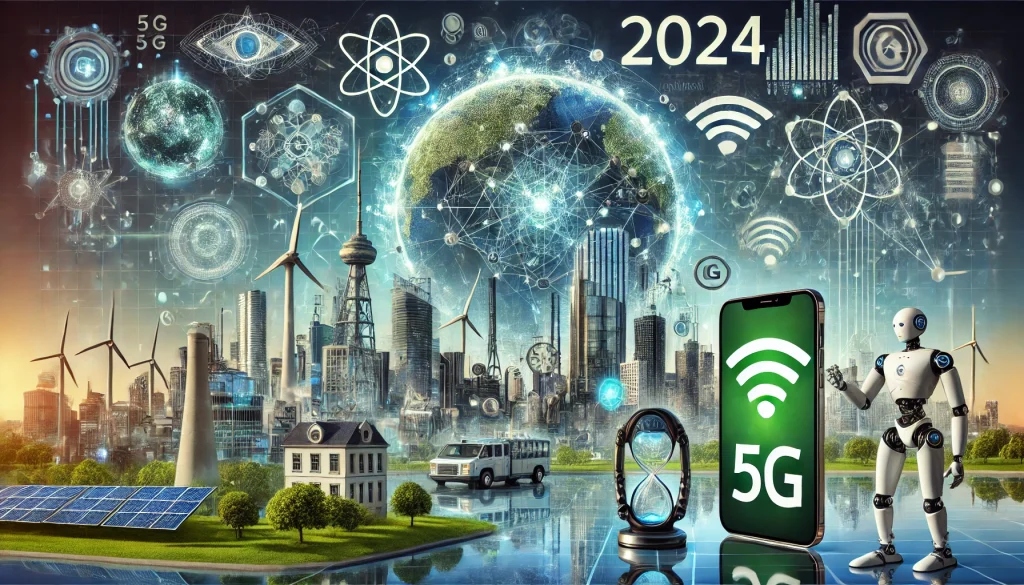As we move deeper into 2024, technological advancements continue to reshape our lives, industries, and the economy. Innovations in artificial intelligence, blockchain, sustainable technology, and digital security are transforming both individual and collective experiences. Below, we explore some of the most important technology trends in 2024, examining how they impact industries, what challenges they face, and where they might lead us.
1. Generative AI in Everyday Applications
Generative AI continues to evolve, with models like ChatGPT, DALL-E, and their successors bringing AI-generated content into daily use for businesses, creators, and consumers. In 2024, we see generative AI integrating deeply into business processes and creative workflows, making tasks like data analysis, marketing content creation, and customer service more efficient.
Companies are also exploring AI’s potential for software development, with tools that generate code, streamline debugging, and even predict software failures. However, ethical challenges and potential misuse, like AI-generated misinformation or privacy violations, remain top concerns. As a result, regulation and corporate policies around AI usage are expected to increase, balancing innovation with accountability.
2. Quantum Computing: From Experimentation to Early Applications
2024 has brought us closer to realizing the potential of quantum computing as early applications begin to emerge beyond laboratories. Quantum computing, which leverages quantum bits or “qubits” to solve complex problems, has promising implications for fields like pharmaceuticals, cryptography, and climate modeling.
This year, we are likely to see quantum computers assisting in breakthrough research for drug discovery and supply chain optimization. Despite these advances, quantum computing remains in its infancy for widespread use, as high costs, limited accessibility, and technical challenges need more refinement. Governments and tech giants are heavily investing in the development of quantum-resistant cryptographic protocols to ensure data security as quantum computing becomes more accessible.
3. The Growth of Decentralized Finance (DeFi) and Web3 Infrastructure
Decentralized Finance (DeFi) and the broader Web3 ecosystem are expanding in 2024. As blockchain technology matures, decentralized applications (dApps) are diversifying to offer alternatives to traditional banking, lending, and asset management services. Enhanced with smart contracts, DeFi allows users to manage assets autonomously, while decentralized autonomous organizations (DAOs) support a more democratic approach to governance.
A key focus this year is improving blockchain scalability and energy efficiency, addressing previous criticisms of high energy consumption and slow transaction speeds. The Ethereum network’s transition to proof-of-stake and other blockchain solutions like Layer 2 scaling have accelerated these advancements. However, regulatory scrutiny of DeFi continues to grow, with governments and institutions working to establish guidelines to protect consumers and prevent financial instability.
4. Sustainable Technology and Green Computing Initiatives
Sustainability is no longer a buzzword but a priority in the tech industry. In 2024, green computing initiatives aim to reduce the environmental footprint of data centers, manufacturing processes, and consumer devices. Companies are increasingly adopting energy-efficient designs, using recyclable materials, and investing in carbon offset programs.
Edge computing, which processes data closer to where it’s generated, reduces the need for large data centers, minimizing energy consumption and latency. Similarly, circular economy practices in electronics manufacturing — like refurbishing and recycling materials — are gaining traction, with tech giants committing to ambitious sustainability goals.
Moreover, AI is being leveraged for climate research, helping organizations model and mitigate environmental impact. As eco-consciousness becomes a core value for consumers, companies face pressure to adopt and publicize their sustainability practices.
5. The Rise of Extended Reality (XR) and the Metaverse
Extended Reality (XR), encompassing virtual, augmented, and mixed reality, is reshaping the way we interact, learn, and work in 2024. The concept of the metaverse — a virtual, immersive, and interconnected space — continues to evolve with advancements in XR technology. Companies are exploring virtual workspaces, retail experiences, and even healthcare solutions through immersive environments.
While initial hype around the metaverse may have tempered, practical applications of XR are expanding in industries like real estate, training, and entertainment. However, challenges such as high hardware costs, user accessibility, and data privacy still need to be addressed to achieve mass adoption.
6. Cybersecurity Advances and Zero Trust Architecture
With digital transformation accelerating across industries, cybersecurity remains a top priority in 2024. The surge in remote work and hybrid setups has necessitated stronger security frameworks to protect against increasingly sophisticated cyber threats. One prominent solution gaining traction is the Zero Trust model, which requires continuous authentication, verification, and access control, regardless of the network’s assumed security.
AI-powered cybersecurity tools are enhancing threat detection, responding to anomalies in real-time, and protecting user privacy. Meanwhile, governments and organizations are focusing on updating regulatory frameworks and compliance standards to protect data more effectively, reflecting the growing importance of cybersecurity in the global digital landscape.
7. Automation and the Workforce of the Future
Automation continues to reshape job roles, particularly in manufacturing, retail, logistics, and customer service sectors. In 2024, robotic process automation (RPA) and AI-driven decision-making are streamlining operations, enabling workers to focus on higher-value tasks.
This trend comes with a growing need for reskilling and upskilling the workforce to match the evolving job landscape. Collaborative robots (or cobots) that work alongside humans, and autonomous vehicles for logistics, are also gaining traction, with companies investing in education programs and initiatives to prepare employees for future roles.
8. Personalized Healthcare and Biotech Innovation
Advancements in biotechnology and AI-driven healthcare are paving the way for more personalized and preventative care models in 2024. Genetic engineering, wearable health tech, and AI diagnostics are enabling early detection and customized treatment plans tailored to individual patients.
Wearable devices are now equipped with enhanced sensors that provide real-time health insights, and gene-editing techniques, like CRISPR, are advancing therapies for genetic disorders. However, these innovations raise ethical questions and face regulatory hurdles, especially in genetic data privacy and bioethics. Nonetheless, healthcare technology is moving toward more personalized, data-driven care models that promise better outcomes and lower costs.
9. 5G and the Road to 6G
5G technology has significantly improved internet speeds and connectivity, transforming industries like transportation, entertainment, and remote work. In 2024, 5G continues to expand its global reach, powering smart cities, autonomous vehicles, and IoT devices.
Simultaneously, research on 6G has begun, focusing on unprecedented speeds, reduced latency, and improved coverage to support future innovations like holographic communication and advanced AI-driven applications. While 6G is not expected to be mainstream until around 2030, early research and investments are already shaping the future of connectivity.
10. Ethical and Regulatory Considerations in Tech
As technology advances, ethical considerations and regulatory frameworks become critical to its sustainable adoption. In 2024, governments worldwide are grappling with how to regulate AI, data privacy, and emerging digital financial systems. Companies are implementing more transparent data policies and committing to fair, ethical use of AI and big data.
We can expect more frameworks guiding the ethical use of technologies in areas like AI, genomics, and data privacy. As these technologies become increasingly integrated into our lives, ensuring they are developed and used responsibly will be a major trend this year and beyond.
Conclusion
The tech trends of 2024 highlight a shift toward responsible, inclusive, and sustainable innovation. Technologies like AI, quantum computing, and XR are pushing the boundaries of what’s possible, while sustainability and ethical concerns guide their development. As these trends continue to evolve, they promise to shape a future where technology empowers individuals, drives economic growth, and addresses some of the most pressing challenges of our time.



